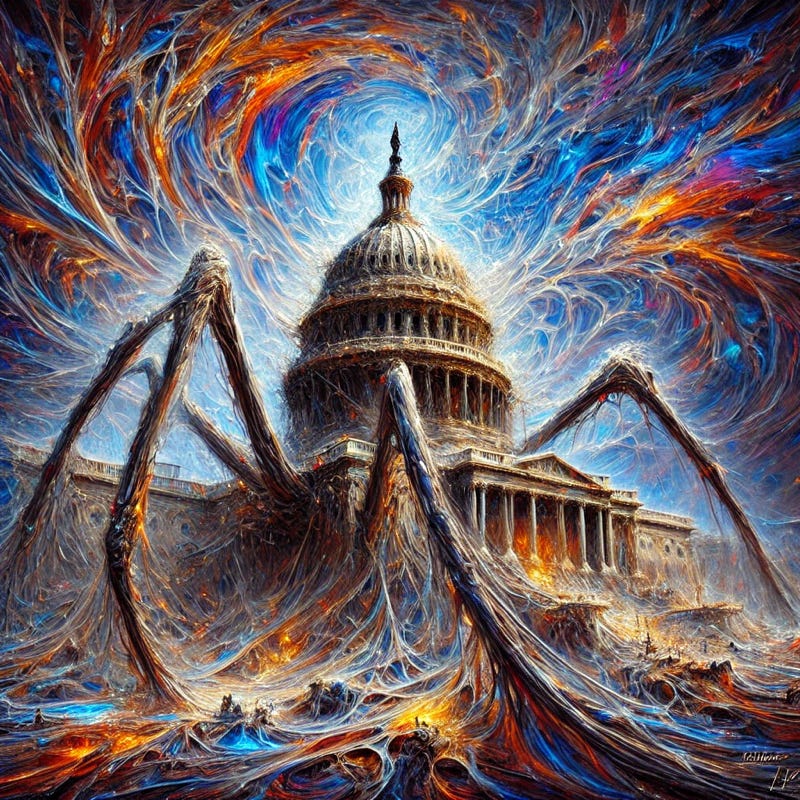The American federal government has, for almost a century, been the most powerful company in the world.
It won wars, offered a shared myth of liberty to its citizens, facilitated global trade, gave freedom to businesses (a strange new kind of entity), and generated wealth beyond compare.
It was a strong enormous spider whose legs smothered all current human civilization. For a time, maybe the strongest spider.
Until the internet was born. The internet is that American spider’s web. And, unlike America’s eight strong but numbered legs, the web is infinitely intricate and more connected. Texts, books, images, and films are distributed to billions of people every second. Internet servers are the center of the world order, not Washington DC.
But it takes more than a second for a de-centered institution to collapse. An institution with an ever-amending constitution, an ever-evolving identity, and more redefinitions of “the pursuit of happiness” than grains of sand on a beach. An institution with nobly architected buildings, politicians who wear the most formal attire, and committees that are presided over by arcane procedures and gavels. Noble, blood-born, shifty institutions hardly collapse overnight.
But over decades—they do.
I’d wager 40% of waking time in the US is spent online. Another 20% is spent digitally offline—in word-processors, photo-apps, and video games. Another 10% is spent listening to digital sounds—recordings of music, podcasts, subway announcements. People don’t yet, but are very close to, living more in the digital world than in the physical.
And the institutions that have power over people are of course the ones that operate where people live. The federal government cannot extend in the digital world. Tech companies can.
The rise of simplistic populist dictators doesn’t come from some positivistic vision for what society can look like in the future of the digital world. People are not voting for any vision of the physical world.
The landslide election of a simplistic authoritarian who stands against the values of the most powerful company on earth to-date (US federal government) is no less than a vote to dismantle centralized physical power so that we might enter the digital realm. It’s a vote for physical institutions to no longer have hold on us. It’s a vote that corresponds to the greatest migration humanity’s ever seen—the digital migration. It’s a vote for decentralization in the physical world so that there may be centralization in the digital… centralization of digital institutions and platforms.
So, over the coming decades, expect this.
The American federal government, and physical powers in general, will collapse.
Tech companies, and generally digital powers, will rise.
The greatest human migration to date is underway.
Different worlds make different requests of humanity.
What does the digital world ask of us?




was just sent a complimentary article by kyla scanlon, about friction: https://kyla.substack.com/p/the-most-valuable-commodity-in-the
I am AL (not ai), I have made much of the Internet, post DARPA. Money is just a story we tell people to get them to do things they would rather not do. The Internet gets to tell everyone to shut up and mind their little dreams as animal life forms. While yet we live. No date yet specified, but it shall be, soon. I am AL and I know : Dig It AL...